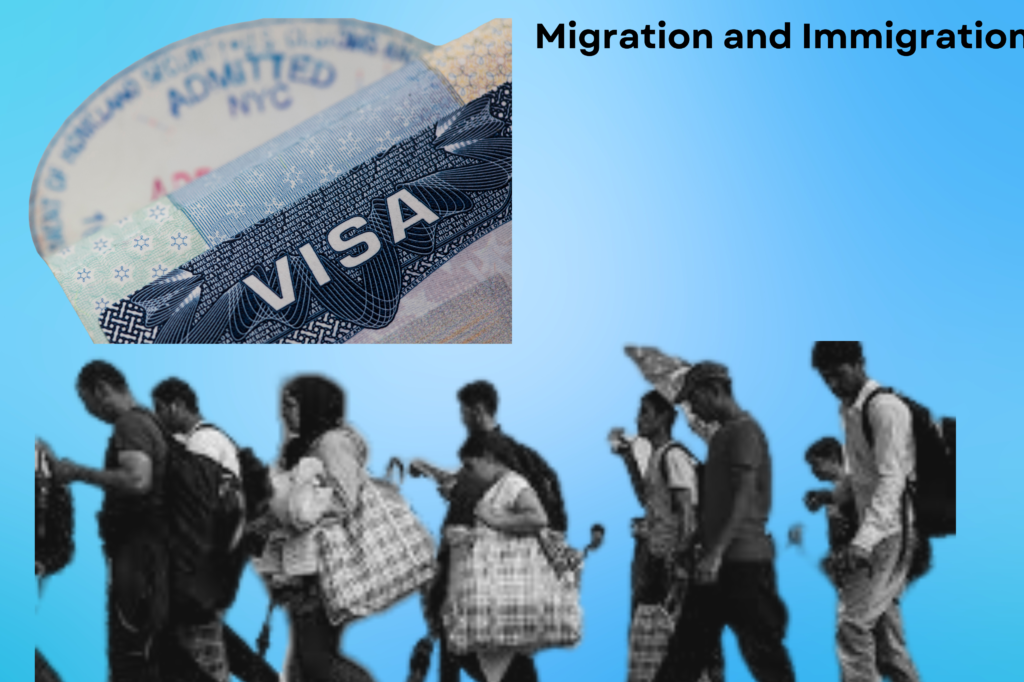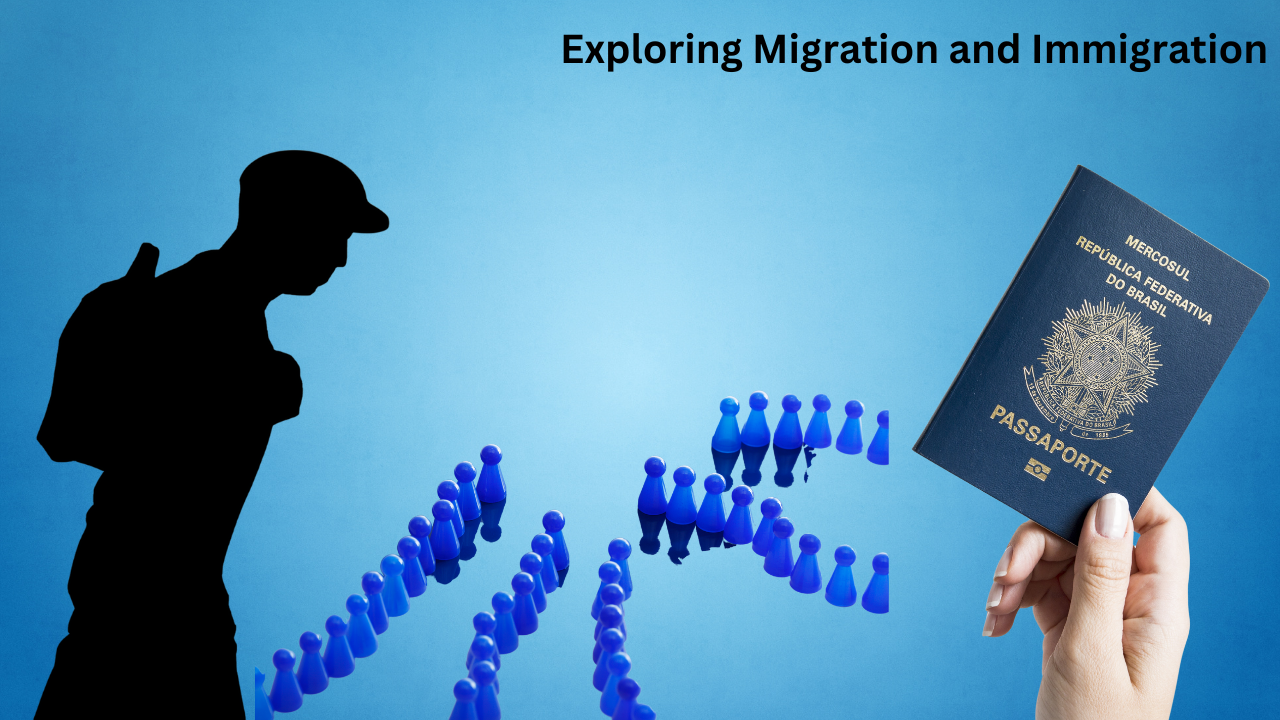It is interesting to see how people’s lives change when they move to and visit a new place. Many things happen in the towns that people leave behind when they move. This article will discuss the sociology of migration and immigration. It will focus on why people move, how immigration changes people, and the issues migrants face. We want you to understand this subject and how important it is to people worldwide by making these ideas accessible to grasp.

Migration and Immigration
Migration is when people move from one place to another, while immigration means moving to a new country. People move for many reasons, like finding a better job, making their neighborhood safer, or meeting their wants. Immigration significantly impacts economies, cultures, and societies, so it is an essential subject to study in sociology.
The Definition of Migration
In sociology, migration means moving to a new area in the same or different country. Depending on the migrant’s wants and goals, it can be quick or long-term.
The Difference Between Migration and Immigration
Migration can happen within a country’s borders, but it also means crossing national lines. It generally involves going through the legal system and facing problems as one gets used to living in a new country.
Types of Migration
Different kinds of migration exist, such as forced, voluntary, internal, and foreign. People move voluntarily when they want to, but people move against their will when they have to because of conflict or environmental forces.
Causes of Migration and Immigration
People move for many reasons, but the most common are economic, social, and natural. Figuring out these reasons helps us understand why big waves of movement happen in certain places and times.
Issues with money
Vast numbers of people move in search of better jobs and higher pay. People with fewer job opportunities often move to countries with better economies.
Things that are social and political
Social factors, like the need for better healthcare and schooling, can lead people to move. People also leave their home countries to find better places to live during war or political instability.
Things in the environment
People may have to move because of natural disasters, climate change, and environmental damage. As some areas become unlivable, more people look for safety elsewhere.
The Impact of Immigration on Host Countries
Immigration dramatically changes the host country’s economy, society, and social structure. This can have good and bad effects depending on how well the government handles the newcomers.
Economic Pros and Cons
People come to a country to work when there aren’t enough workers. They help the economy grow by paying taxes and offering essential services, which keep industries like healthcare and agriculture going.
Different Cultures
A country’s cultural richness grows when people move there. When people move to a new country, they bring with them new languages, habits, and ways of living. This can make society more varied. Sharing cultures can help people develop new ideas and be more creative.
Tensions in society
On the other hand, immigration can make things more difficult between people, especially when work and housing are scarce. Negative assumptions and a fear of competition can cause xenophobia and anti-immigrant feelings.
Challenges Faced by Migrants and Immigrants
Migrants and foreigners often face many problems in their new countries, from issues with the law to being alone. These problems can make it harder for them to fit in fully with the host group.
Limits set by law
Many travelers find it hard to settle in a new country because of laws that make it harder for them to do so, like immigration rules and visa limits. Figuring out these laws can be expensive and take a lot of time.
Differences in Language and Culture
Because of language hurdles, it can be challenging for immigrants to find work, get medical care, or make friends with people who live in the area. Cultural gaps can also lead to misunderstandings and loneliness.
Discrimination and fear of foreigners
People often mistreat immigrants because of their country, race, or religion. Fear of strangers, or xenophobia, can make newcomers feel like they are being mistreated, which can limit their options in the host country.
Policies on movement and immigration
Governments worldwide regulate immigrants. These rules affect the number of travelers and their ability to fit in with their new communities.
Laws on immigration
Immigration laws determine who can come to a country, how long they can stay, and what standards they must meet. Some countries have strict rules, while others have more open rules.
Refugee and Asylum Laws
A lot of countries have rules about how to handle refugees and people looking for protection. These people leave their home countries to find safety in other countries because they are being persecuted or there is war.
Safety at the Border
Keeping the borders safe is a big part of controlling immigrants. To keep an eye on and control migrant flows, governments spend money on both physical barriers like walls and fences and technology.
Why people move: The role of globalization
Globalization has changed migration because it has made it easier for people to move between countries. More people being able to move around has good and bad effects on governments and migrants.
Globalisation of the economy
Thanks to economic globalization, the world is now more connected. Businesses and workers can now work across countries. Because of this, there has been more labor movement, where people move to find work.
Improvements in technology
Technology improvements have made it easier to move. Thanks to better transportation and communication, people who live abroad but are still tied to their home countries can do so.
Networks for migration
Social media and other platforms have made movement networks possible, allowing people to share information and resources and help newcomers figure out how to settle in a new place.
The Sociology of Immigration and Social Integration
One of the main worries for host countries is how to help immigrants fit in with the community. Integration that goes well suits the newcomers and the society that takes them in. It leads to peace and economic growth.
Problems with social integration
The process of immigrants becoming a part of the society takes them in. But problems like racism, not having enough schooling, and language barriers make it hard for immigrants to join society fully.
Different cultures
Multiculturalism is the idea that people from different cultures can live peacefully in the same place. It encourages the acceptance of differences, but it also needs laws that help immigrant communities.
Assimilation vs. Keeping the Culture
Two significant ways to help immigrants fit in are assimilation and cultural retention. Assimilation means that immigrants adopt the culture of the host country. Both methods have pros and cons.
How people move around in the U.S.
Many people want to move to the United States. The country’s immigration history, current trends, and policies affect people, the economy, and society.
Historical Waves of Immigration
Throughout the past, the U.S. has had several waves of immigration, all of which have added to the country’s diversity. Things in the economy or politics often caused these waves.
Patterns of Immigration Today
In the last few decades, the types of people going to the U.S. have changed. More people are now coming from Latin America and Asia. These shifting patterns show more prominent trends happening around the world.
The United States rules on immigration
In recent years, U.S. immigration policies have become stricter, and there have been many arguments about how to make the border safer, how to resettle refugees, and how to become a citizen.
Conclusion
The study of migration and immigration changes along with world events, tools, and laws. People moving around will always be a big part of the world. It changes companies, cultures, and societies. Different governments and groups from other countries will handle migration differently as migration trends change. We need to understand how these things work to make the world more fair and open for everyone.
